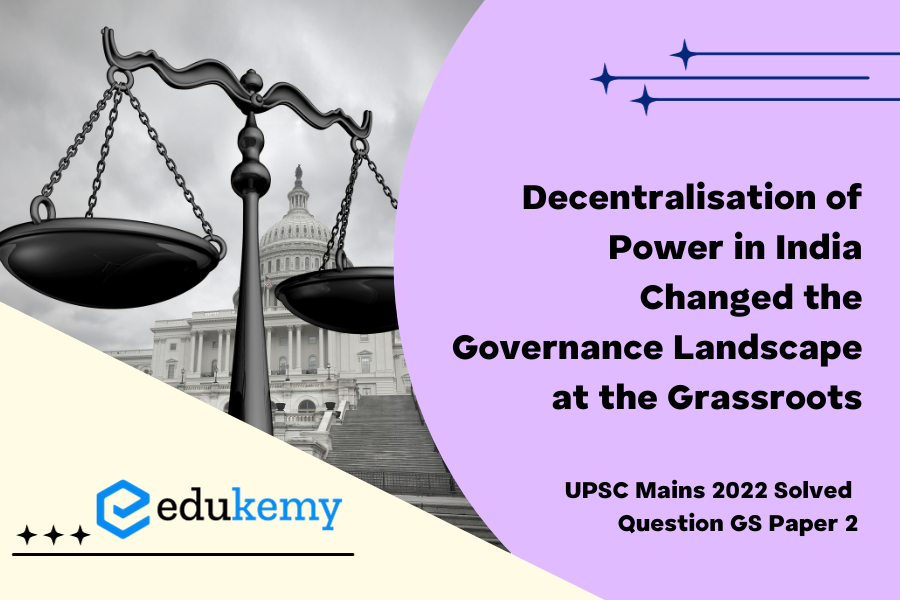The decentralization of power in India has significantly transformed the governance landscape at the grassroots, fostering participatory democracy and empowering local communities. Through initiatives like the Panchayati Raj system, decision-making authority has shifted closer to the people, promoting better accountability, efficient resource allocation, and tailored development solutions.
UPSC Mains General Studies Paper – 2 Mains 2022
UPSC Mains Civil Services IAS Exam Question Paper – 2022
Contents
Approach
- Introduce the key words decentralization of power in India with constitutional references.
- Describing the aspects, the governance reaching at grassroots level by establishing “Panchayat and Municipalities”
- Briefly giving the function of panchayat samiti with under given subjects mention some examples with the constraints for slow progress.
- Accordingly conclude it.
Answer
Introduction
- Democratic decentralization is barely alive in India. Over 25 years after the 73rd and 74th constitutional amendments (establishment of panchayats and municipalities as elected local governments) devolved a range of powers and responsibilities and made them accountable to the people for their implementation, very little and actual progress has been made in this direction.
- Under Article 40 of the Indian Constitution, the States shall take steps to organise Village Panchayats and endow their powers and authority to function as unit of self-government.

Body
A study for the Fourteenth Finance Commission by the Centre for Policy Research, shows that all States have formally devolved powers with respect to five core functions: water supply, sanitation, roads and communication, streetlight provision and the management of community assets to the gram panchayats.
Achievement of Decentralization of Power
- Decision-making: The local people can participate in decision-making at local-level issues.
- Women representation: 33% reservation for women has helped to increase women’s voice and representation in our democracy.
- Swachh Bharat Abhiyan: In 2019, India became open-defecation free because of ground level work by local bodies.
- Literacy campaign: Arati Devi, sarpanch in a village in Ganjam district in Odisha is credited with starting a literacy campaign for women and reviving traditional folk art in Ganjam.
- Self-help Groups: Meena Behen, sarpanch from a village in Gujarat, has worked for inculcating leadership skills to the self-help group (SHG).
Key issues
- The constraint lies in the design of funding streams that transfer money to local governments.
- First, the volume of money set apart for them is inadequate to meet their basic requirements.
- Second, much of the money given is inflexible; even in the case of untied grants mandated by the Union and State Finance Commissions, their use is constrained through the imposition of several conditions.
- Third, there is little investment in enabling and strengthening local governments to raise their own taxes and user charges.
- The last nail in the devolution coffin is that local governments do not have the staff to perform even basic tasks.
Furthermore, as most staff are hired by higher level departments and placed with local governments on deputation, they do not feel responsible to the latter; they function as part of a vertically integrated departmental system.
Corruption at Lower Levels of Hierarchy
- Decentralised corruption tends to get exposed faster than national or State-level corruption.
- People erroneously perceive higher corruption at the local level, simply because it is more visible.
State governments are in Postponement of Local Body Elections
In addition to above structural problems were not bad enough, in violation of the constitutional mandate of five yearly elections to local governments, States have often postponed them.
- In 2005, when the Gujarat government postponed the Ahmedabad corporation elections, a Supreme Court constitutional bench held that under no circumstances can such postponements be allowed.
- Subsequently, the Supreme Court rejected other alibis for election postponement, such as delays in determining the seat reservation matrix, or fresh delimitation of local government boundaries.
- Yet, in Tamil Nadu, panchayat elections have not been held for over two years now, resulting in the State losing finance commission grants from the Union government.
Conclusion
India’s efforts in Decentralization represent one of the largest experiments in deepening democracy. Decentralization is always a messy form of democracy, but it is far better than the operation of criminal politicians at the higher level who appropriate huge sums of tax-payer money, without any of us having a clue.

In case you still have your doubts, contact us on 8792740517.
For UPSC Prelims Resources, Click here
For Daily Updates and Study Material:
Join our Telegram Channel – Edukemy for IAS
- 1. Learn through Videos – here
- 2. Be Exam Ready by Practicing Daily MCQs – here
- 3. Daily Newsletter – Get all your Current Affairs Covered – here
- 4. Mains Answer Writing Practice – here


